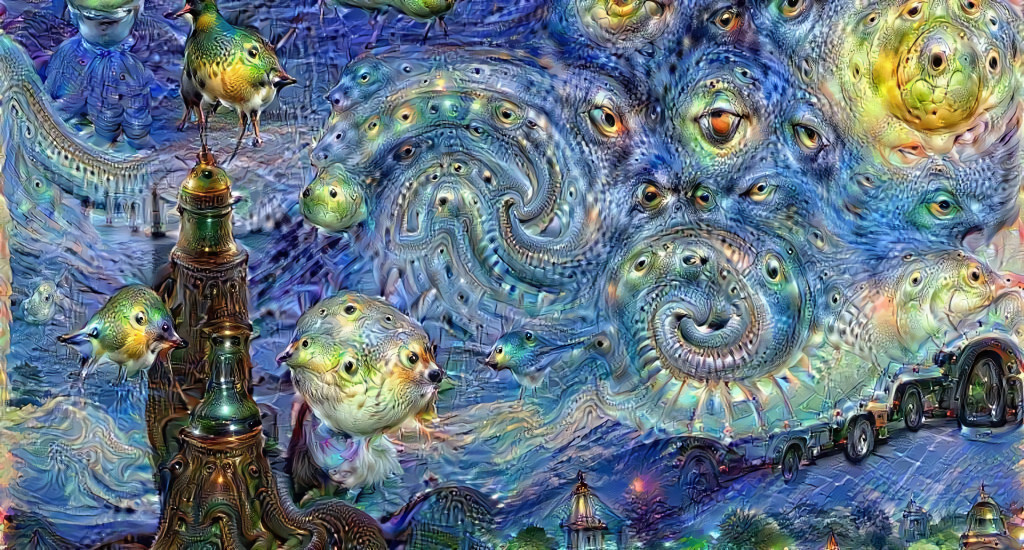The Gig Economy, which is, as of this writing, the single post on a WordPress blog entitled Zero HP Lovecraft,1 is of and about the internet. Specifically, the internet of 2018, its social media and blockchains. What initially appears to be a particularly flowery and rambling blogpost reveals itself as a fictional story at whichever point you start curiously googling its references to invented subreddits and cryptocurrencies. If you’re discovering it through this review, I’m afraid I’ve spoilt that for you. Sorry.
It’s an ambitious work that doesn’t completely hang together: the strong introduction is let down by an jarring change of pace a little over halfway in and an ending that descends into incoherence. So, not terribly unlike an HP Lovecraft story, unsurprisingly. While its prose thankfully avoids Lovecraftian turgidity, it occasionally flares up with tumours of overwrought academic wankery and overindulgent asides.2
Deep learning systems aren’t magic; they’re just eyes that see hyperplanes of relatedness in high-dimensional vector spaces.
The meta-sensual content of these memories could be likened to the epistemology of dreams, in which we know things instantly, automatically, with neither evidence nor the need for it.
As Lanier has shown, the cortical homunculus is malleable when embodied in virtual spaces, and I felt at that moment as if all capital and data had become extensions of my body, high dimensional ley lines, digital theomorphism.
All these concepts are explained in ways that seem to be more geared towards expressing the author’s erudition than imparting understanding. This, admittedly, could be read as characterisation of the first-person narrator.
Fortunately, these academic tumours are balanced by plenty of sharp humour and keen observations.
My hobbies include speculating on cryptocurrency and shitposting, which is where you put in minimal effort in creating your online presence so that you aren’t culpable when it’s bland.
Normally I just fulfill my smart contracts and go back to reading Deleuze and Guattari, by which I mean I play first person shooters while the pdf is up on my other monitor
Often I see people lament their phone use as “addiction”, as if there is something so much better out in front of us, as if the world of ideas is so terrible. All interstitial moments have become corridors of ideas. We pass through idle moments, car and bus rides, bathroom breaks, hallways, sidewalks, and airports, each of us minimally present, the whole time floating in an ocean of text and images.
Instead of sitting down, I stood by the window and looked down over the city, enjoying the kind of view that only series b funding can buy.
And there’s also a third category of bits that are brilliant and overwrought at the same time.
In the world of bits and distributed ledgers, immutability is high technology bordering on magic, an asymptote you can kiss but never rest upon, but in the world of atoms and artifacts it is the default.
There’s even a section that begins with a heavily altered version of The Call of Cthulhu’s celebrated opening paragraph, which starts: “The most menacing thing in the world is the ability of the cloud to correlate its contents.” Such a passage could only come out of our modern meme-saturated culture, in which every famous image, clip or quote can become a Mad Libs template. Small brains reference existing memes in their stories; galaxy brains wield the underlying logic of memes like this.
A problem common to writers of this sort of sparkling and idiosyncractic prose is that all their characters tend to sound the same. This is very much the case for The Gig Economy. Not only do the two narrators sound the same, but quoted characters do too, in a way that occasionally harms immersion. I found it difficult to believe that a couple of fintec programmers in the current year (a cohort I have some familiarity with) would unironically use words like “elanguescence” or “vile” in casual conversation, no matter their esoteric interests.
The prose walks a tightrope between pretentious and legitimately clever, often falling off to one side or the other. It starts falling off more to the former side as the story draws to its close, ending with a deranged monologue that presumably signals the narrator’s descent into madness. There’s meaning in there, somewhere, but it’s all a little obtuse for my liking, a World’s Largest Rubber Band Ball of tangled implication. Which was also a problem I had some of the original Lovecraft’s stories, so it’s a good homage and perhaps the real issue resides with me.
Shortcomings aside, this is the first horror story I’ve read about technology and the internet where it’s clear that the author actually knows what he’s talking about and derives the horror from the subject in a meaningful and mostly coherent way. If, like me, you can’t look at a deep dreaming picture for more than a minute without getting thoroughly spooked, this story will rattle you.

The horror of this story is the horror of this image.
The Gig Economy is a fascinating piece with more home-runs than strike-outs. It’s an enthralling, unsettling ride through the mind of someone who sees the horror in the machine and the lurking menace of our technology as it becomes ever more sophisticated, numerous and impossible to control or even understand. And it’s the sort of the thing you could only find on the internet.
 David Yates.
David Yates.